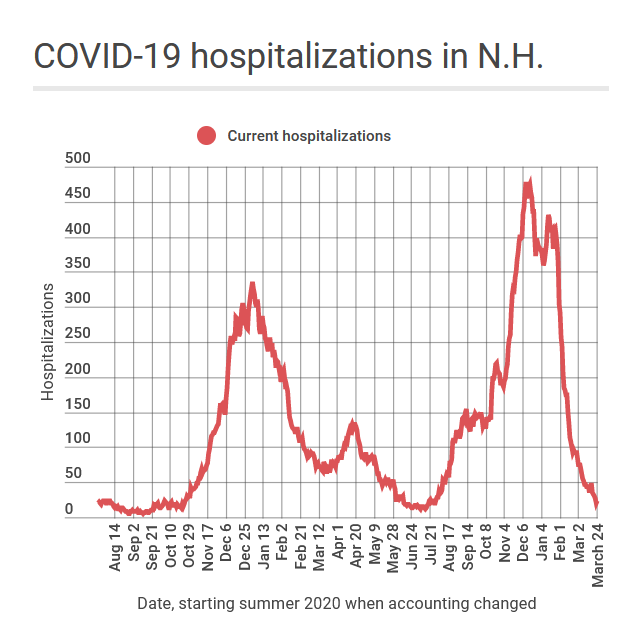A more contagious COVID-19 variant is on the rise in New England, but experts still don’t know whether that’s bad news.
When scientists talked about the Omicron variant this winter, they were most likely referring to the subvariant called BA.1, which was responsible for record-breaking case numbers and hospitalizations. Now, another Omicron subvariant, BA.2, is becoming more common.
Dr. Michael Calderwood, an infectious disease expert from Dartmouth-Hitchcock, said BA.2 is about 30% more transmissible than the original Omicron variant. However, he said the subvariant is worse at overwhelming immune responses, making it more likely that humans will be able to fight it off.
BA.2, which was dubbed the “stealth variant” in its infancy, is quickly becoming the dominant COVID strain in the northeast.
In New England, BA.2 now makes up more than half of all COVID-19 cases, according to the Centers for Disease Control and Prevention. State epidemiologist Ben Chan said fewer than 10% of infections in New Hampshire are currently due to the BA.2, according to CDC data and genetic sequencing at the NH Public Health Laboratories.
It’s unclear whether this rise in BA.2 will cause another COVID-19 wave as recent infection rates have been extremely low.
In the United States and New Hampshire, the overall number of reported infections and hospitalizations have declined despite an increasing proportion of BA.2 infections, Chan said.
According to the CDC’s community-level metrics, all counties in NH are currently experiencing a “low” level of COVID-19.
“The issue with hospitalizations is a little bit more puzzling because although the hospitalizations are going up, it is very clear that their use of ICU beds has not increased,” said Dr. Anthony Fauci last week. “Are the numbers of hospitalizations a real reflection of COVID case, or is there a difficulty deciphering between people coming into the hospital with COVID or because of COVID?”Support the Concord Monitor. Subscribe Today
Calderwood said the rise in cases in Europe is likely due to more people gathering indoors without masks, and waning immunity from vaccination, particularly among those who have not received a booster shot. He said data from Europe shows that boosters are good at preventing severe illness from BA.2.
News of the BA.2’s rise makes New Hampshire’s record-low hospitalization rate bittersweet.
At Concord Hospital, the COVID-19 situation is better than it has been since before the first winter surge in 2020. Just one COVID patient was reported in the hospital late last week, and just one in the Franklin and Laconia hospitals owned by the health system.
With the exception of one week in late February of this year, when all three hospitals reported zero COVID patients, the totals are lower than at any in the past 18 months, said Concord Hospital spokesperson Matthew Johnson.
As hospitalizations and cases have declined in the state, the N.H Health Department has begun dismantling testing and vaccination sites.
All of the state-managed COVID-19 vaccination sites will permanently close by the end of the month. Four of the seven mobile vaccination teams will demobilize on the same day.
State-managed testing sites already permanently closed earlier this month in response to low community transmission and low demand for tests.
Even as dominant variants begin to shift, public health officials’ advice remains the same: get vaccinated. Chan said everyone older than five should make sure they are up to date with the recommended COVID-19 vaccines.
- by Teddy Rosenbluth, Concord Monitor


 Return to the Concord Monitor
Return to the Concord Monitor